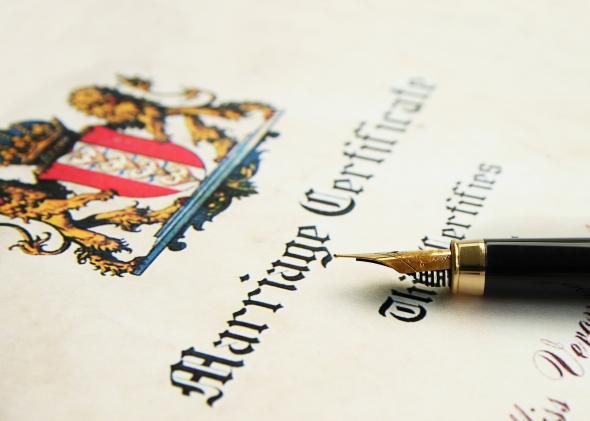Gay marriage is now legal in a lot of states with a lot of residents who really hate gay people. Some of those residents are tasked with granting marriage licenses in their official capacity as clerks or magistrates. What happens when a gay couple asks an anti-gay clerk for a marriage license that they are legally entitled to? Does she have a religious right to turn them away?
In October, the Alliance Defending Freedom—a far-right group dedicated to legalizing homophobia and criminalizing homosexuality—issued memos advising clerks in Virginia and Oklahoma that they are legally empowered to refuse service to gay couples. (Marriage equality recently became law in both states.) Now Americans United for the Separation of Church and State, usually abbreviated as AU, has fired back with its own memo, asserting the exact opposite: that clerks have no right to rebuff gay would-be newlyweds and that gay couples have a legal right to be free from such discrimination. AU’s memo is six pages long. But the ADF’s arguments are so fatuous and untenable that they could probably have been dispensed with in a paragraph.
The thrust of the ADF’s case is that forcing clerks to issue marriage licenses to gay couples qualifies as religious discrimination, and thus violates the free exercise clause of the First Amendment. This claim verges on self-parody. In a famous 1990 case, the Supreme Court ruled (in an opinion written by Justice Antonin Scalia) that “the right of free exercise does not relieve an individual of the obligation to comply with a valid and neutral law of general applicability.” In other words, the First Amendment doesn’t protect your right to disregard a law that forces you to violate your religious beliefs, so long as that law wasn’t intended to hamper your religious practices. Since nobody (well, no reasonable person) is arguing that marriage equality is actually just a furtive effort to persecute Christians, the free exercise argument is ludicrous on its face.
There’s also something repulsively hypocritical about the ADF’s discrimination argument here. For years, the ADF has claimed that anti-gay marriage laws don’t unconstitutionally discriminate against gay people. These laws, the group insists, are merely designed to protect a heterosexual definition of marriage, not to codify prejudice against gay people. Now that the law increasingly treats gays and straights equally, the ADF has suddenly decided to expand its definition of discrimination. In the group’s revised view, barring gays from marriage isn’t discriminatory—but requiring government employees to issue marriage licenses to gay couples is pure discrimination designed to victimize Christians for their religious beliefs. It’s stunning to see once-respected organization include such a crassly opportunistic argument in a public memo.
The ADF’s second claim is equally witless. Tucked within Title VII of the Civil Rights Act of 1964 is a requirement that employers “reasonably accommodate” their employees’ religious beliefs—unless an accommodation would impose an “undue hardship on the conduct of the employer’s business.” The ADF thinks that Title VII requires the government to “accommodate” anti-gay clerks’ beliefs by letting them reject same-sex couples. But AU gives a fantastic reason why accommodating anti-gay clerks’ religious beliefs would cause an undue hardship: It might be unconstitutional (and could therefore lead to an expensive lawsuit). If the government is constitutionally required to let gay people get married, it surely cannot then authorize state employees to deny gay couples marriage licenses. Singling out gays as a class distinctly deserving of discrimination is always an equal protection violation, whether it’s done in the name of preserving “traditional marriage” or “religious liberty.”
Of course, the Supreme Court hasn’t (yet) declared that gays have a constitutional right to marry. So AU provides a clever backup argument: Permitting religious clerks to discriminate against gay couples would run afoul of the First Amendment’s establishment clause. A religious exemption, the high court has repeatedly held, violates separation of church and state if it punishes innocent third parties. That’s because when the government accommodates religious beliefs at the expense of others who don’t share those beliefs, it appears to be unconstitutionally endorsing one religion over another. This eminently sensible principle would seem to sink the ADF’s arguments, for pretty obvious reasons. If a state permitted orthodox Christians to deny marriage licenses to gay couples, its government would seem to be endorsing Christianity—while simultaneously disregarding the indignity and prejudice suffered by the gay couples.
Perhaps sensing the weakness of its primary points, the ADF hedges its memos with a small-bore argument, noting that many states (including Virginia) require the government to demonstrate a compelling interest before burdening religious beliefs. Again, this claim is a complete nonstarter. As Justice Anthony Kennedy noted in his Hobby Lobby concurrence, the state has a “compelling” interest in preventing someone’s “religious exercise” from “unduly restrict[ing] other persons … in protecting their own interests.” These words seem designed to rebut the notion that snubbing and humiliating gay people qualifies as “religious liberty” that the government must protect.
The ADF doesn’t think that complying with the constitution qualifies as a compelling interest, and it certainly doesn’t think that protecting the dignity of gay couples is of any importance whatsoever. That’s no surprise—but it is a bit startling to see a once-esteemed group pick such an absurd fight. The ADF looks at the law through the fisheye lens of anti-gay animus, and the results of its analysis have always been correspondingly warped. For years, this bias made the group’s arguments appear offensive. At this point, however, the ADF is merely embarrassing itself.
